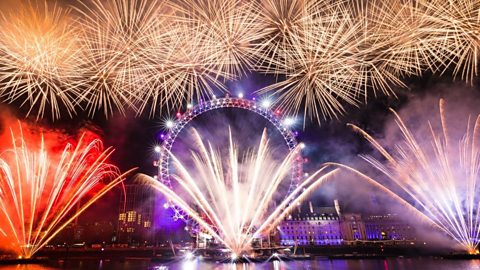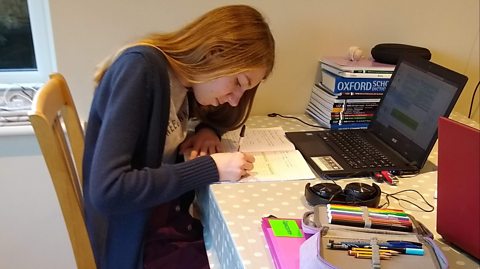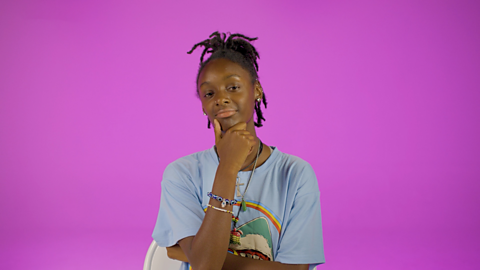It’s safe to say there will be lots of people who can’t wait to put 2020 far behind them.
In more normal times that would involve a big celebration, perhaps out in your city or town centre, with plenty of fireworks and friends. This year, unfortunately, that won’t be possible, so some might try to recreate the magic from home, with the help of video calls and fireworks in the garden.
But while a fireworks display may be fun for many, for some people it can be really scary and anxiety-inducing.

Helen is autistic, and works at the National Autistic Society as their Equality, Diversity and Inclusion Co-ordinator. She says that New Year can be an extremely difficult night for her and other autistic people.
She explains that most years she is quite apprehensive when it’s coming up to the night, and a big part of why is the fireworks, and more specifically, the sound they make.
“I’ve always found it a real pity that fireworks are so distressing sound wise, as I love the colours and shapes they make in the sky. The trouble is the sound is so unpredictable – especially the 'bangers' and ones that make the high pitched whistle as they go up, these sounds go right through my head and leave me feeling like I’ve hit my head on something hard.
“The pain can be intense and impacts on my balance, fine motor skills and even my ability to talk once a sensory overload sets in.”
Intense sensitivity to sound is something many autistic people have in common, and it can be extremely debilitating if you’re not expecting to hear a loud noise.
“When a sound is a surprise it can be like being hit in the head by a flying football – there’s sometimes a one or two second delay between me hearing the noise and the pain striking."
Helen says that for high pitched noises, this might start as a hot stabbing pain through the temples, and for other lower noises it can feel like a painful thud on top of the head. This pain can then develop and make your whole head feel like it’s starting to cramp up.
Helen explains that a lot of this pain is felt behind the eyes, which is why it’s common to see autistic people squeezing their eyes shut when they hear an unexpected noise. It can help relieve the pain, but also shuts off your vision to lessen the sensory overload.
Because of this, fireworks, whether on New Year’s Eve or any other festival, can be an absolute nightmare.


One New Year’s Eve a few years ago, Helen had gone to bed after midnight thinking that the fireworks in her local area had finished. Unfortunately, that wasn't the case.
“The sudden bangs just outside my window made me actually scream in fright and I full on fled my bedroom into my bathroom. I ran the taps as I curled up under the sink, trying to concentrate on the sound of the running water and getting my heart rate to slow down as it was racing faster than after a gym session.
“I ended up spending over an hour sat on the floor, my cheek resting against the cool porcelain sink stem, trying not to be sick.”
Plan, muffle, recovery
Helen says it can help if you’re autistic and worried about New Year’s Eve to do make sure you plan your evening as best you can:
“My preparation is very much about getting myself calm beforehand and trying where possible to muffle the fireworks sounds with predictable noise.”
Helen says it’s also a good idea to think about things you could do to distract yourself while they’re going off - if you like jigsaws, reading or watching films, all of these might serve as a good way to take your mind off things.
Next step is preparing for the aftermath, as the effects can last a good while after the fireworks have stopped, Helen says.
“Think about what you will need in the minutes and hours following the sensory overload/meltdown to help you recover from it – maybe having preferred comfort food in ready to eat or having a favourite pair of pyjamas or dressing gown to put on to help you sleep.”
If you’re planning some fireworks in your garden this year and you know you have autistic neighbours, or if you’re looking for ways to be considerate to others (as it’s not just autistic people who might dislike them), Helen says: “Please, set them off at midnight (not before) so its predictable to us, and keep it short."
Finding completely different ways of seeing the New Year in altogether would be a dream, Helen says.
"If the public could fall in love with another way of celebrating major events that don’t involve small chemical explosions in the sky that would be fantastic!"

More advice from the National Autistic Society
If you have autistic neighbours, it will really help if you can let them know you’ll be releasing fireworks. Or if you can, you could invest in silent fireworks to help ease their stress and anxiety around the loud bangs.
And, for autistic children and adults, wearing ear defenders or even watching firework displays on television can help to ease stress and anxiety. Of course, every autistic child and adult is different and it’s vital they’re involved in the planning to make sure the celebrations work for them.
Lockdown with autism: Why it’s hard and how to help
The coronavirus pandemic is creating some very specific challenges for autistic people.

Exam Essentials
Our exam veterans give you some expert tips on how to boss your exams.

Six pieces of good news you might have missed in 2020
End the year on a high with these uplifting stories.
